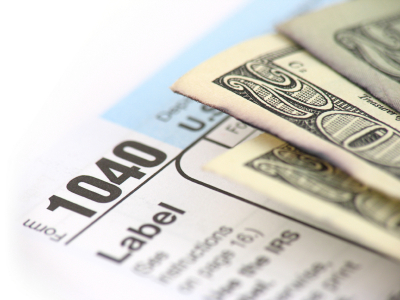Lindsay Dressler, in Kansas City last weekend for a conference, did a double take at her change from the hotel gift shop.
A sticker pasted right across George Washington's portrait said: “Americans who did their own taxes last year left a billion dollars behind. Get your billion back, America.”
That's right. An ad for H&R Block.
The tax preparation company has been handing out real dollars bearing its marketing message for this year's tax season. There's a toll-free phone number to call Block, a Web address and even a footnoted disclaimer that not everyone gets a tax refund.
“I reported it to the Department of the Treasury,” said Dressler, an Idaho resident. “Think of the precedent that would set if we allowed companies to advertise on currency. It would get out of control very quickly. It should be off limits for advertising.”
Apparently, it already is, according to a little-noticed federal law that has been in its current form since 2006. And H&R Block has decided to stop its stickering but to keep up with the free money.
“As we execute our marketing campaign across the country, we will continue to hand out dollar bills separate from other marketing materials,” spokesman Gene King said Friday in an email responding to questions from The Star.
He did not say why the Kansas City-based company changed its plans.
Many Americans are familiar with a law making it illegal to deface U.S. currency — intentionally rendering it unfit to reissue. And H&R Block had dealt with that by making the stickers easy to remove without damaging the dollars.
But there is that other law that seems to say it is illegal to attach advertisements to money.
Section 475 of Title 18 in the United States Code says, in part, anyone who “writes, prints or otherwise impresses upon or attaches to any such instrument, obligation, or security, or coin of the United States, any business or professional card, notice, or advertisement, or any notice or advertisement whatever, shall be fined under this title.”
Decisions about taking action under the currency laws are left to federal prosecutors for each local jurisdiction. A few checks turned up little evidence of the ad ban being enforced.
The U.S. attorney's office in Kansas City was unaware of Block's ads on money and would not comment on their legality, spokesman Don Ledford said.
Still, Ledford said he gets the idea. Money makes a powerful advertising medium.
Ledford said he might not take a coupon someone is handing out, but “if they hand me a dollar bill with a sticker on it, yeah, I'd take that.”
The precedent for currency ads may belong to the ABC television network. It used money stickers to stir interest in “Commander in Chief,” a 2005 one-season series in which Geena Davis played the nation's first woman president.
The network “got the U.S. Treasury to OK the circulation of an undisclosed number of dollar bills with stickers of Davis' face covering George Washington's,” the Los Angeles Times reported in 2005.
H&R Block worked with Gogorillamedia.com for its currency ads. The New York alternative advertising agency had boasted about its clients' ad money campaigns on its blog.
One post last April said GoGorilla Media's currency ad campaigns had “proven to be an effective tactic for dozens of our clients from banks to TV networks to pharmacies.”
Old Navy, a GoGorilla Media client, did a dollar campaign last fall. It distributed 210,000 dollar bills bearing a sticker promoting a $1 million sweepstakes awarded on Thanksgiving Day, according to the ad agency's website.
National Geographic, yet another GoGorilla Media client, used 8,000 $5 bills bearing stickers to promote its “Killing Lincoln” docudrama last February.
GoGorillia Media's Sasha Engel, in an interview on Wednesday, declined to identify other currency ad clients.
She said the agency had taken measures to ensure the stickers wouldn't deface the money.
“There hasn't been a problem because of this special method we use,” Engel said. “We tried a lot of different kinds of adhesives.”
The website for the U.S. Bureau of Printing and Engraving refers to the defacement law but makes no reference to Section 475's ban on attaching advertising.
Hank Eskin was the first to mention an advertising ban.
In an interview Thursday, he said he's known about Section 475 since he got a call from the Secret Service in 2000.
Eskin runs WheresGeorge.com, a website that allows consumers to track where their dollar bills have been. Many have seen the website's promotion stamped on dollar bills, usually in red ink.
Eskin created the site in 1998 to get people to play the tracking game and buy his rubber stamps.
“In 2000, the Secret Service called me up and basically said that amounts to advertising on currency, which is illegal,” Eskin said in an interview on Thursday.
Eskin stopped selling the rubber stamps. The website still operates and suggests visitors can get a stamp made and mark money www.wheresgeorge.com on their own.
GoGorilla Media's Engel did not reply to inquiries Thursday about the attachment ban and was unavailable Friday. A spokeswoman said Friday that no one else at the firm would be able to comment.
The agency took down its blog items on Old Navy and National Geographic. Videos associated with the campaigns remained available Friday through Youtube.com.
Block's currency ad campaign ended after a brief run. King said it had kicked off Jan. 17, when local “street marketing” teams handed out an undisclosed number of the stickered simoleons here and in other cities.
King said Block also used an “armored truck” bearing the company's marketing images for some of its Block buck drops in Kansas City. For example, the truck made an appearance at the Sprint Center last Saturday for the George Strait concert before heading next to Dallas.
The stickers are one element of Block's national marketing campaign. Block has said its own study of do-it-yourself taxpayers' returns last year found that Americans had left more than $1 billion of their money in the U.S. Treasury needlessly.
Its advertising message is “Get your billion back, America.” Just don't expect to see any advertising stickers attached to it.
—————————————
Copyright 2014 – The Kansas City Star
Thanks for reading CPA Practice Advisor!
Subscribe Already registered? Log In
Need more information? Read the FAQs
Tags: ESG, Income Taxes, Software, Taxes



